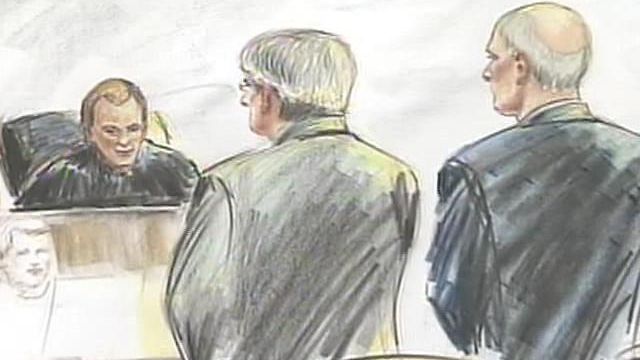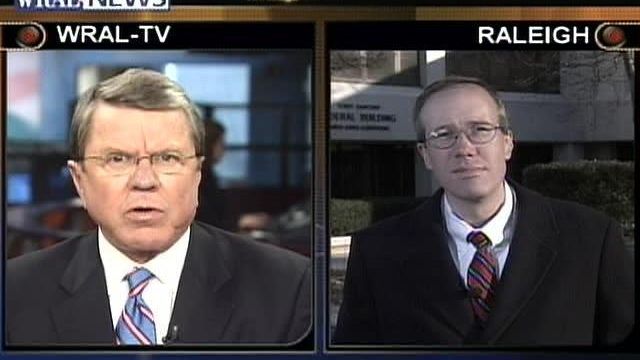Local Politics
Black Pleads Guilty to Corruption Charge
Former House Speaker Jim Black pleaded guilty Thursday to a federal corruption charge, ending months of teetering on the brink as a growing list of associates were convicted of various offenses.
Posted — UpdatedRALEIGH, N.C. — Former House Speaker Jim Black pleaded guilty Thursday to a federal corruption charge, ending months of teetering on the brink as a growing list of associates who were convicted of various offenses.
Once one of the most powerful politicians in North Carolina, Black pleaded guilty to one count of corruptly accepting something of value, a felony charge that carries a maximum sentence of 10 years in prison and a $250,000 fine. U.S. District Judge James Dever will sentence him on May 14.
The charge involved soliciting and accepting at least $25,000 from chiropractors looking to influence legislation between 2000 and 2005, authorities said. No other lawmakers and no chiropractors were implicated in the case, authorities said.
Black approached two chiropractors between 2000 and February 2002 and "informed them that cash payments would be more helpful than campaign contributions made by check," according to information filed with the court. The chiropractors recruited a colleague to make payments as well, and they gave Black $8,000 at a private dining club in Charlotte in February 2002, the court documents state.
The three chiropractors and other members of the North Carolina Chiropractic Association held fundraisers for Black between 2002 and 2005 at restaurants in Charlotte and Concord during which they handed over about $17,000 in cash to him, including two payments made in restaurant men's rooms, according to the court documents. A chiropractor also gave a $4,000 check made out directly to Black, the documents state.
Black deposited the money in his personal accounts and never reported the donations to the State Board of Elections, the documents state.
The court documents also state that Black instructed the chiropractors to tell a federal grand jury investigating campaign-finance irregularities last summer that the cash payments were "a little bit of money to help (Black) with expenses along the road while (Black) was out running around the country."
"Dr. Black knows and accepts that he should not have received and accepted that cash from these chiropractors," defense attorney Ken Bell said after the court hearing.
Bell said he couldn't explain why Black took the cash, noting the 71-year-old optometrist didn't need the money.
"I'm not going to try to excuse it. I'm not going to try to justify it. It's just a shame he did this to himself," Bell said.
Power, Money Led to Downfall
Black served as House speaker for a record eight years before announcing in December that he wouldn't seek a fifth two-year term. He resigned his House seat Wednesday to comply with a state law that bars felons from holding public office.
He was known throughout state government as a masterful deal maker and prolific fundraiser. On the House floor and in back rooms of the Legislative Building, he often pulled together coalitions of lawmakers to pass bills. On the campaign trail, he pulled in hundreds of donations from individuals and special-interest groups for himself and other Democrats.
Political consultant Joe Sinsheimer, a longtime Black critic, noted that combination of talents contributed to Black's downfall.
"We have a 'pay-to-play' culture where (lawmakers) are willing to break down special interest in return for personal reward," he said. "It's time for elected officials inside the Democratic Party and the leadership in this state to face up to (the fact that) we have a corruption problem on Jones Street."
Days before the 2003-04 legislative session opened, former Forsyth County Rep. Michael Decker switched his allegiance to the Democrats, depriving House Republicans of the narrow 61-59 majority they gained in the 2002 election. With the House evenly divided, a coalition forged by Black was able to garner enough support to gain control of the chamber and allowed him to retain a share of the speakership with former Moore County Republican Rep. Richard Morgan.
Decker, who later switched back to the GOP before losing his 2004 re-election bid, pleaded guilty last August to extorting a $50,000 bribe to switch parties. He later implicated Black in the scheme, calling him a "co-conspirator."
Three others with ties to Black also were found guilty in recent months of crimes ranging from lobbying violations to fraud to obstruction of justice.
- Meredith Norris, Black's former political director, pleaded no contest to a lobbying violation in August after not registering with the state as a lobbyist for lottery vendor Scientific Games.
Edwards' perjury indictment came after the State Board of Elections conducted hearings into Black's campaign financing, including donations he received from optometrists, video poker operators and lottery interests. A judge last summer ordered Black's campaign to return illegal contributions from optometrists.
Power Crumbles
Black had never been linked to any of the crimes until Thursday. Although he repeatedly denied any wrongdoing, his power base began to crumble as federal and state corruption investigations closed in around him.
Republicans and even some Democrats called for Black to step down, and the House adopted new ethics rules and lobbying regulations to eliminate the appearance of special-interest influence.
Political newcomer Hal Jordan, an IBM contractor, fought Black nearly to a draw in the November election. The State Board of Election conducted a recount before declaring Black the winner.
Fellow lawmakers were stunned by the admission that their former leader took illegal cash payments.
"I don't know why he agreed to plead to that after all these months of saying something different," said state Rep. Earline Parmon, D-Forsyth.
Gov. Mike Easley also expressed disappointment that Black's long political career ended in a federal courtroom.
"It is a sad day when any public servant faces criminal charges. Unfortunately, these matters of misconduct may well overshadow his 25 years of public service," Easley said in a statement.
Sinsheimer said Black's plea was too long in coming for him, although he was just as shocked as others at the facts behind the case.
"He's proved himself to be a scoundrel," Sinsheimer said. "We now have to face as a state that we've had a felon in the second- or third-highest-ranking office in our state -- someone who was using his position to solicit cash in a bathroom."
Mecklenburg County Democrats must meet to name a successor for Easley to appoint to the House and fill out the rest of Black's two-year term. But Democratic officials said that likely wouldn't happen until March.
Meanwhile, Bell said Black would be talking with federal investigators about public corruption issues until his sentencing in May. A state corruption investigation also is underway, and Black might be pulled into that as well.
"He has offered and will cooperate fully with any authority that wants to talk with him," Bell said. "That may make some people uncomfortable, but we look forward to it."
• Credits
Copyright 2024 by Capitol Broadcasting Company. All rights reserved. This material may not be published, broadcast, rewritten or redistributed.






